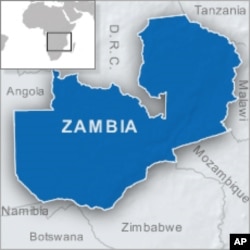HIV and tuberculosis are spreading in Zambia's prisons because of poor conditions and a lack of medical care, according to a report by three human rights groups.
The report says prisoners in Zambia suffer from malnutrition and poor medical care, and are at risk of being raped and tortured.
It says one of the main problems is overcrowding - a result in large part of slow trials and appeals. Some prisoners, it says, can spend years in prison waiting to be tried.
Health and Human Rights Division Director Joseph Amon, of Human Rights Watch, one of the groups that worked on the report, says inmates with HIV and tuberculosis are worst affected.
"Again and again people were saying, 'I have been sick for months, I have been unable to get access to treatment'. 'We have seen people die in our cells and we have called out that they needed to get help, they needed to get treatment,' and the prison officials have said, 'This is a prisoner who might escape, we cannot take them,' or 'This is a prisoner who is faking it, he is not really ill.' And what happens is that, in fact, people are dying," Amon said.
Amon says inmates are crammed together in tiny cells, where sexual abuse is common. Children, says the report, are particularly vulnerable to rape by adult inmates in their cells.
Amon says condoms are not available. The repercussions for Zambia as a whole, he says, are clear.
"Both guards and prisoners leave prisons everyday," Amon said. "Their sentences end, they go back into the community, and allowing massive overcrowding and TB and HIV transmission to occur in prisons results in TB and HIV transmission in the community inevitably."
Zambia Prisons Service Medical Director Dr. Chisela Chileshe says limiting the spread of infectious disease needs to be a priority.
"We are trying our best so that wherever we find TB, which is infectious, they are actually isolated," Chileshe said. "What I care about is that they are not infecting others. We are trying to do that in the midst of overcrowding."
He says Zambia's government knows more work is needed.
"So we are making headway, there is the political will, but there is more to be done," Chileshe said. "We need to improve infrastructure, we need to improve nutrition for these patients."
The report was published by the Prisons Care and Counseling Association, the AIDS and Right Alliance for Southern Africa, and by Human Right Watch.










